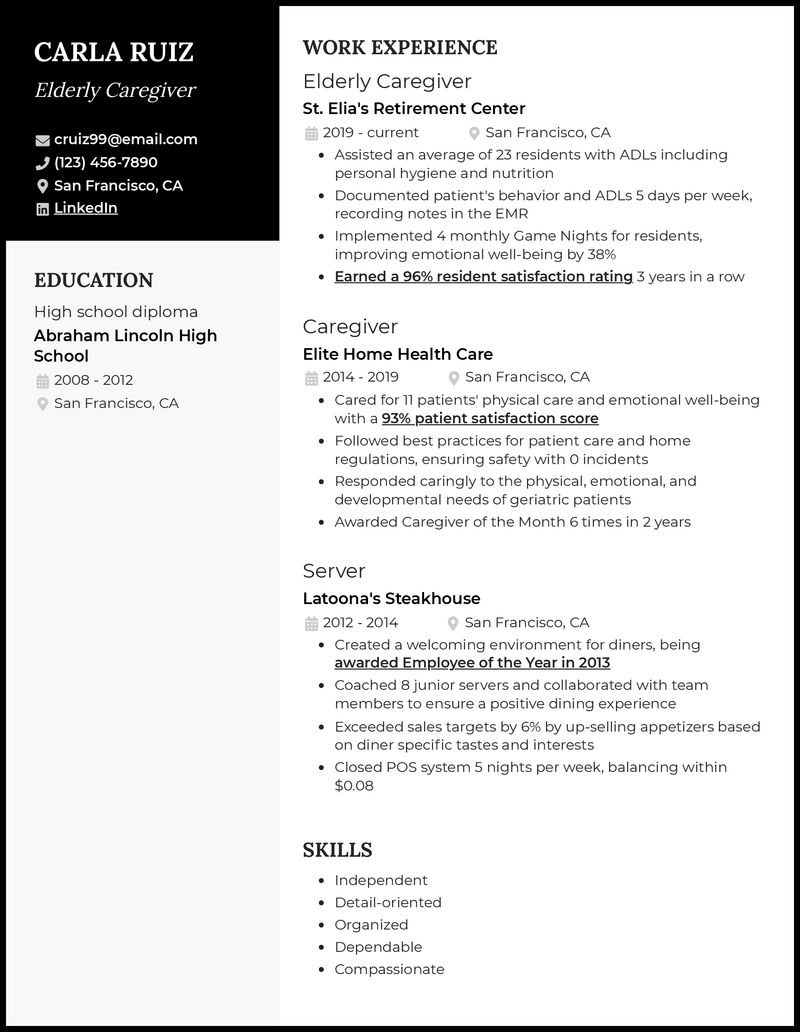As an elderly caregiver, you know that the importance of compassion cannot be overstated. You’ve worked with people from many walks of life and helped them navigate difficult situations daily.
If anyone asked your previous clients, they’d know your empathy and multi-tasking skills make you the perfect fit for the role—but how do you check your piece and make this clear on a one-page resume template?
We’re here to help. With our ai cover letter writer and tips, your elderly caregiver resume will highlight your strengths so you can easily focus on scoring your next job.
Related resume examples
What Matters Most: Your Skills & Caregiving Experience

In the role of an elderly caregiver, your people skills take center stage, but it’s important to go beyond the standard “friendly” or “patient.” While both are important, be more specific to stand out from the crowd.
Let your caring personality shine in the cover letter and during the interview, but on your resume, demonstrate how you assist the elderly in daily life. This includes activities of daily living (ADLs), such as bathing, grooming, and feeding.
Remember to mention if you have any experience working with clients with Alzheimer’s or dementia. Skills like administering medication, CPR, and first aid are also crucial.
Here are some important skills for an elderly caregiver:
9 best elderly caregiver skills
- Monitoring Vital Signs
- Medicine Administration
- CPR
- First Aid
- Alzheimer’s Care
- Driver’s License
- CNA Certification
- Mobility Assistance
- Nutritional Support
Sample elderly caregiver work experience bullet points
Your role as an elderly caregiver is diverse, encompassing experiences from working in large facilities with multiple clients to one-on-one care with a single client.
People hiring for the role of an elderly caregiver will want to know how your expertise made your clients’ lives better. You can do this by highlighting measurable impact.
An example of this would be to focus on what you achieved with a specific task. Instead of saying “cared for 11 patients,” say, “cared for 11 patients, providing physical and emotional assistance and daily medical reports over 3 years.”
Let’s look at a few more ideas from our resume examples:
- Assisted an elderly client with ADLs, including personal hygiene and nutrition, maintaining 97% client satisfaction rate over a 2-year caregiving relationship
- Administered medication to 28 residents, adhering to 3 distinct schedules
- Implemented tailored dementia care strategy for 8 geriatric clients, resulting in a visible improvement in quality of life over a 6-month period
- Facilitated personalized mobility support for 10 clients, resulting in a 20% reduction in fall incidents and promoting independence
Top 5 Tips for Your Elderly Caregiver Resume
- Emphasize client-specific care
- Working as an elderly caregiver means you must be adaptable and prepared to meet your patients’ challenges. Showcase versatility by discussing your work with individuals with Parkinson’s, Alzheimer’s, or mobility challenges.
- Talk about your certifications
- Mention relevant certifications, such as First Aid, Certified Nurse Assistant (CNA), HHA, CPR, CADDCT, or CDP. Not every role requires it, but they help you stand out.
- Your medical experience matters
- You won’t always be expected to provide medical assistance, but it’s a bonus if you know how. Mention your experience working with oral and injectable medications or assisting with physical exercises.
- Adjust your resume for each job
- You know better than anyone that no patients are the same, so your resume must change sometimes. For example, if you’re going to be the sole caregiver of a disabled patient, note your experience in mobility assistance and your driver’s license that qualify you to bring them to various appointments.
- Highlight specialized training
- If you have specialized training useful to geriatric clients, add it to your resume. This includes courses in palliative care, depression in seniors, fall prevention, and physiotherapy.
Many elderly caregiver roles don’t require previous experience caring for seniors, but they all require compassion and excellent people skills. Mention similar roles, such as customer service jobs, childcare, or hospitality to highlight your ability to look after others.
Most roles require a high school diploma or a GED certificate. If you have a bachelor’s or master’s in a relevant field, such as gerontology, nursing, nutrition, or social work, cite that, too. Remember to list your certifications, such as the Home Health Aide (HHA).
Aim to fit your entire resume onto a page. If you have a lot of experience in similar roles, try using a resume outline to help you pick the most relevant jobs to focus on your accomplishments and skills, such as earning Caregiver of the Month or implementing a new exercise routine for elderly residents that improved their mobility.










